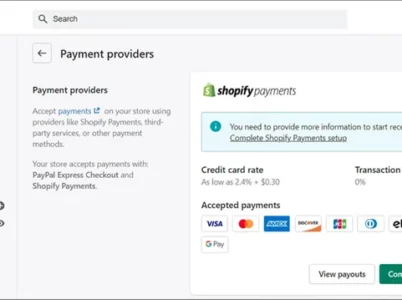WorldPay is a prominent payment solutions provider that enables businesses to accept and process payments securely and efficiently. With its robust payment gateway, merchant services, and comprehensive range of payment options, WorldPay serves as a one-stop solution for businesses worldwide. Whether it's credit card processing, online payments, or mobile transactions, WorldPay caters to diverse payment needs.

Execution of Javascript is mostly used on Shopify’s client side.
Independent developers may create Shopify themes and applications thanks to Shopify.
- Safety: The Shopify platform was created with security in mind from the very beginning. The business has made significant investments to protect its platform from hackers and other dangers. Numerous built-in security safeguards in a Shopify shop guard your online store against hackers and fraudsters. Additionally, it provides a strong PCI compliance system that safeguards the credit card information of your consumers.
- Personalization: It would help to distinguish yourself from the competitors when you sell products online. Your eCommerce store's personalization features will give your clients the impression that they are doing business with a company that values them. Shopify's capability to customize your website based on the items clients are seeing, the page they're on, and other factors are one of its most potent capabilities.
- Quickly loading: You want your consumers to be able to explore items fast and simply if you run an online business. Shopify loads pages quickly.
BigCommerce, a versatile and open SaaS e-commerce platform, was established in 2009 and enabled companies of all kinds to create and grow their online stores.
While Shopify is excellent for getting started, BigCommerce is preferable if you want to expand and scale your business.
Pros
Strong default features are a part of any strategy.
More than 55 payment gateways are supported, with no additional transaction costs.
No coding expertise is necessary to use the drag-and-drop visual editor called Page Builder.
Cons
Unlike Shopify, which offers nine free themes, BigCommerce has only five, despite having many commercial themes.
There is a little learning curve compared to Shopify because there are many more built-in capabilities.
- Basic Plan
Basic Plan: This Shopify account is where you start and sell on your website or blog. All Shopify plans include everything you need to get, including a theme that may be cut to customers for your Shopify store. When billed monthly, this plan costs $29, and when billed yearly, it costs $14.44 per month.
Shopify Payments customer support:
Because Shopify’s customer care is available around the clock, you can count on getting a prompt answer anytime you have a query or issue. Additionally, Shopify includes a help forum where customers may interact with one another and share advice for running the website.
Shopify Payments transaction fees: When utilizing Shopify Payments, stores pay no transaction fees. For our Basic Shopify, Shopify, and Advanced Shopify plans, extra costs of 2%, 1%, or 0.5% will apply if you use a third-party payment processor.
To offset the payment processing cost, Shopify Payments charges you a fee when you capture the money for an order. This cost varies depending on the credit card type being used (for instance, a VISA card’s fee occasionally varies from an American Express card’s fee) and the country in which the credit card is registered:
The price to process credit cards issued in the same nation as your shop is payment processing fees (domestic).
Cross-border payment processing fees are what it costs to accept credit cards issued in a nation other than the one where your shop is located.
Shopify Payments integration:
To give you a variety of payment alternatives, Shopify has collaborated with hundreds of payment gateways. Depending on your requirements, you may select from various payment channels, including PayPal, Stripe, and Apple Pay.
Use Shopify Payments to accept payments from credit cards, debit cards, and PayPal in your store. Shopify Payments offers the greatest security and fraud prevention, making it the ideal choice for many retailers.
Additionally, Shopify’s tax tool, which automatically calculates taxes depending on client location, makes tax computations straightforward. If required, you can also use tax exemptions.
Shopify Payments payment options: Getting paid.
- Shop Pay.
- Shopify Payment
- PayPal.
- Accelerated checkouts.
- Shop Cash.
- Shop Pay Installments.
- Third-party providers.
When deciding which payment options to provide, there are several distinct factors to take into a third-party service if you wish to allow credit card payments from your consumers.
Customers may pay for goods and services online without using a credit card via several ways, including PayPal, Meta Pay, Amazon Pay, and Apple Pay. You could also wish to accept different payment options, such as Bitcoin.
Consider the nations where your firm is based and your consumers are located when selecting a payment provider. You can learn which payment gateways are accessible in your country and what currencies they support by consulting Shopify’s list of payment gateways by country.
Shopify Payments payment gateway: Shopify Payments effortlessly connects with all of the features of your e-commerce site, offering incredibly competitive prices and top-notch security. Our payment gateway helps you accept credit card payments and process orders rapidly by synchronizing crucial data between payments and orders.
PayPal. By the end of Q2 2021, there will have been 311 billion transactions completed using the PayPal app, making it the most widely used third-party payment gateway for Shopify. PayPal is quick and easy to set up, offering free and premium merchant account alternatives.
Shopify Payments mobile app:
Shopify features a sizable selection of Shopify applications that might aid in expanding your company. Everything from applications for order administration, marketing automation, and social network integration to apps for inventory management, shipping, and accounting software connection may be found in the Shopify app store.
There are also interfaces with several applications, such as Facebook Ads and Google Analytics. The Shopify app store is organized into categories to make it simple for you to identify the applications that are most useful for your company.

Based in Ottawa, Ontario, Shopify Inc. is a global e-commerce powerhouse offering an online storefront and retail point-of-sale system. Established in 2004, Shopify has undergone significant technological evolution, employing sharding and transitioning to separate instances known as pods. The platform provides diverse services for online shops, encompassing payment processing, marketing, shipping, and customer interaction. Notably, Shopify utilizes JavaScript for client-side execution, enabling independent developers to craft themes and applications.
In terms of security, Shopify Payments and Paypal both perform well. To satisfy your website’s security standards, you may discover strong features in Shopify stores like Fraud Block. Users may benefit from a secure and convenient gateway thanks to the Buyer Protection program offered by Paypal and Seller Protection.
Giving your consumers a variety of handy payment alternatives is possible when you utilize Shopify Payments and PayPal at the same time. Customers will feel appreciated if you provide them the choice between Shopify Payments and PayPal.
Your consumers will rapidly finish the electronic transaction procedure if they feel valued.
Shopify has a tool that allows you to see who has abandoned their carts so you can examine, plan, and persuade them to come back and finish their purchases.
When it comes to creating storefronts, Shopify is already effective. However, PageFly can help you if you want extensive customization and interaction with other third-party apps. When it comes to editing and developing shop pages in your online Shopify store, it gives you the power of an expert.
Businesses can easily accept and handle online payments thanks to Stripe, a complete payment processing platform. It provides various services, including payment gateway integration, subscription management, fraud prevention, and reporting tools. Founded in 2010, Stripe has quickly gained popularity among merchants due to its powerful features and developer-friendly approach.
Opayo, formerly known as Sage Pay, is a prominent software company that specializes in providing payment solutions to businesses. With its robust infrastructure and extensive range of services, Opayo facilitates secure online payment processing, making it easier for businesses to accept payments from customers. Opayo payment processing offers solutions that empower businesses to efficiently manage their payment transactions. With Opayo's payment processing services, businesses can securely accept and process a variety of payment methods, including credit cards, debit cards, and digital wallets.






